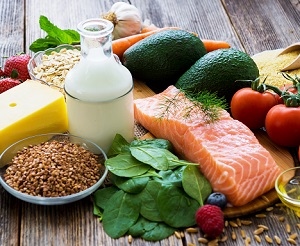 Everyone knows diet plays a large part in our overall health, but how many of us consider the impact eating has on our hearing?
Everyone knows diet plays a large part in our overall health, but how many of us consider the impact eating has on our hearing?
It turns out that what we put into our bodies plays a significant role in how well we hear. Research indicates that a diet high in fruits and vegetables can actually slash the risk of hearing loss by 30%.
Audio Help Hearing Centers in New York City, Scarsdale and Stamford reminds you that diet can indeed help impact hearing health.
The increasingly popular Mediterranean diet – a plant-based diet that includes nuts and whole grains – can help fight hearing loss. This diet recommends using olive and canola oil instead of butter, herbs and spices instead of salt, fish and poultry in place of red meat. Limit processed foods and sugary drinks, although a glass of wine is permitted at dinner.
In general, a balanced, nutritious diet promotes proper functioning of the body’s systems. Here are several minerals that have been singled out by experts for their contributions to better hearing:
- Zinc: This dynamic mineral helps maintain the immune system, aids in the growth of body tissues and metabolizes nutrients. Zinc helps fight off cold-causing germs, which can lead to ear infections – cells of the inner ear have the highest concentration of zinc of anywhere in the body. Studies have also found a link between zinc levels and tinnitus (ringing in the ears). Zinc can be found in chickpeas, lentils, beans, nuts, dairy products, red meat, dark chicken and
- Potassium: Fluids in the body tend to decrease as we age. Potassium regulates fluid levels in blood and tissues. Age-related hearing loss can be affected by low fluid levels in the inner ear. Fluid is critical for proper function of the cochlea, a coil-shaped portion of the ear. You can find potassium in foods such as bananas, potatoes, spinach, tomatoes, melons, lima beans, low-fat milk, raisins and
- Magnesium: In addition to fighting noise-related hearing loss, magnesium is important for regulating blood pressure and heart rhythm, and strengthening bones. Studies discovered that when combined with vitamins A, C and E, magnesium can help protect the inner ear hair cells from hearing damage. Magnesium is found in many fruits and vegetables, whole grains, dark chocolate, avocados, nuts, tofu and
- Folic acid: This B-vitamin helps with the creation of new cells as well as improving circulation. Low levels of folic acid may contribute to presbycusis (age-related hearing loss). A popular theory is the folic acid aids the body in metabolizing homocysteine, a circulation inhibitor. Folic acid can be found in foods such as broccoli, beans, peas, spinach, lentils and organ meats.
Browse your vitamin aisle accordingly to make sure you’re getting enough of these hearing health boosters. For more information on services available at Audio Help, call 888-290-1194 or schedule an appointment online.

